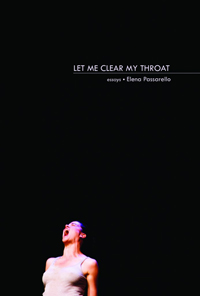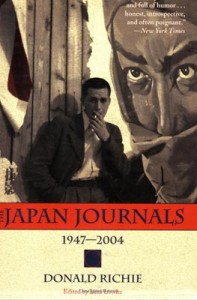East Bay Poetry Summit

Do you like summits? Do you like poetry? Do you live in or around the Bay Area? You’re in luck! Info provided by event organizer Andrew Kenower after the jump…
A Slow and Delicious Torture: A review of Elena Passarello’s Let Me Clear My Throat
 Let Me Clear My Throat
Let Me Clear My Throat
by Elena Passarello
Sarabande Books 2012
240 pages / $15.95 Buy from Sarabande or Amazon
When I was twelve, and my class was preparing for my elementary school’s annual musical performance, our teacher, Mrs. Janssen, pulled me aside. She wanted me to sing a couple solos, and even inserted a threat or two to get me to do it. “You have a wonderful voice,” she said. “And if you don’t do this I will fail you.”
An effective proposition for a twelve-year-old, I took the solos. I had range, then—could have hit both the low and high notes of any song we performed—but I could feel the low ones getting easier. My voice was changing, though unfortunately not rapidly enough for me to opt out of these performances. Eventually our class recorded a CD, where “Kiss Him Goodbye” can be heard in a charming soprano and “Good Lovin’” a flat and boring tenor.
This is the memory that arrives when I read Elena Passarello’s Let Me Clear My Throat. I read about her morphing voice box, her sickness, her eventual obsession with the voice as a thing, and I’m taken back to memories of my own voice changing.
“My body had decided that once it stopped screaming, it had nothing,” she writes. But she is wrong about this. Though her theatrical performances may have kept her, for a while, from singing, she has clung to her voice. As a writer, she has given us a microscopic look at the Rebel Yell, the birdsong, the terrifying scream of a woman about to be stabbed in the shower. A scream she certainly knows how to discuss:
Like breaking a box of emergency glass to pull an alarm, when we make our voices scream, the beeline of serious air not only buzzes the famous cords that create speech and song, it also crashes into a second pair of flaps at the top of the larynx: the false vocal cords. This creates the grate that we hear in a screamer’s tone, a grate that articulates the rarity of its use. It says that a scream is physical work we should only force on ourselves at moments of ultimatum. That’s why we know to come running when we hear a scream.
March 1st, 2013 / 12:00 pm
Donald Richie and The Japan Journals
 The Japan Journals: 1947-2004
The Japan Journals: 1947-2004
by Donald Richie
Stone Bridge Press, 2005
496 pages / $18.95 Buy from Amazon
Donald Richie passed away on February 19, 2013. Many people knew him as the preeminent critic of Japanese film, bringing attention and exposure for directors like Akira Kurosawa and Yasujiro Ozu to Western audiences. “Whatever we in the West know about Japanese film, and how we know it, we most likely owe to Donald Richie,” director Paul Schrader declared. I became familiar with his work through his Japan Journals which was edited and compiled by Leza Lowitz, covering his life from 1947-2004. It’s a hybrid work that is in part autobiography, a compendium of Japanese culture, a menagerie of famous writers and directors, and a confessional. Richie first visited Japan in 1947 as a typist for the U.S. Civil Service and returned to stay, in part due to their greater tolerance of homosexuality (he was openly bisexual). What struck me about his writing were his keen observations that felt less like wordy descriptions and more like a cinematographer setting up a scene from a film. Take for example when he described the writer, Yukio Mishima:
“Look at Mishima, that casual wardrobe— the leather jacket the medallion on its thin gold chain, the boots, the tight trousers, and the wide belt. These create a cutout figure, an outline, and a recognizable icon. We can trace its lineage. From Hemingway to Brando and beyond, this image presumes virility.”
Or W. Somerset Maugham as an old man in 1959:
“The stutter is initially surprising. He is so very old, and stuttering is an affliction of the young. Even more adolescent seeming is that he apparently never accustomed himself to it. It still retains, after all these decades, the power to disturb. He remains embarrassed by it.”
Similar to the cinematographer, it’s the direction of the camera that highlights the perspective. Rather than painting with light though, he painted with his words. Richie knew how to craft a scene in a way that was not only entertaining, but gave us an unexpected insight into his subject. This often entailed taking famous figures like author Truman Capote or Nobel Laureate Yasunari Kawabata, and making them relatable and surprisingly human. He didn’t shy away from the negative nor the more sexual elements which he viewed without judgment or bias. As an expat, he was the outsider looking in, giving him the advantage of observer by being partitioned off. Surrounded by the rituals and societal customs of Japanese culture, it was probably as stark a contrast to his childhood growing up in Lima, Ohio as one could imagine. Even when he could reproduce their behavior perfectly, he stated with an air of accepting regret:
“I behave in the Japanese manner. I refuse something, have to be urged, I say I am wrong when I am not. This brings smiles and nods. But I am not seen as behaving “like a Japanese.” I am seen as behaving properly.”
March 1st, 2013 / 12:00 pm
